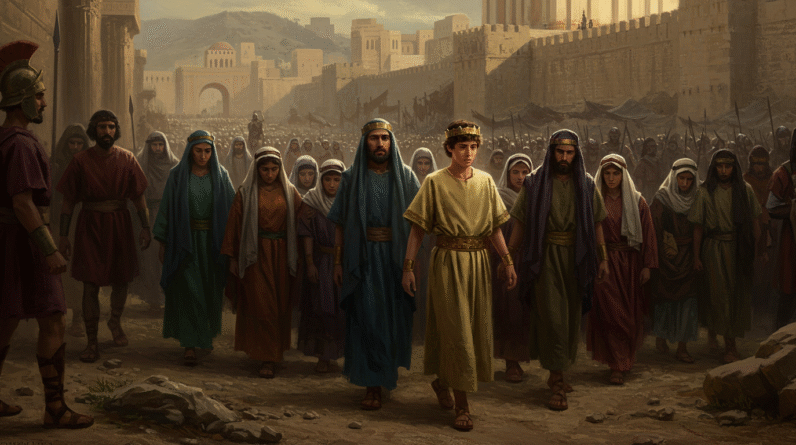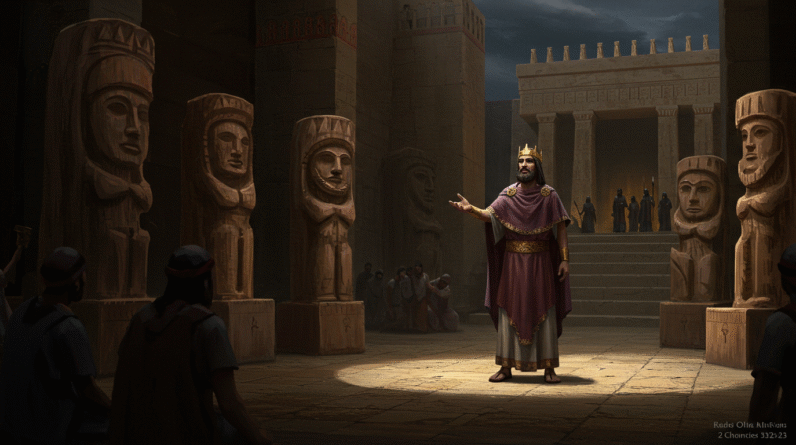Jotham: A King Who Walked Steadily With God (2 Chronicles 27:6)
You come to Jotham like you come to a stranger at a party who’s quietly reading a book in the corner and somehow seems less showy than everyone else but steadier — not because he declares himself virtuous, but because his steadiness is what you notice first. The Chronicler sums him up in a short phrase: he “walked steadily with God.” That line is small, but it’s tidy and unshowy, and it invites you to linger. Read it and you feel the picture of a man who managed ordinary things well and who, by doing so, left an imprint that the historian wanted preserved. See the verse yourself: 2 Chronicles 27:6.
Who was Jotham?
Jotham is a name that slips in and out of the biblical narrative without the fanfare others get. He’s introduced economically: “Jotham was twenty-five years old when he became king, and he reigned in Jerusalem sixteen years” — that’s 2 Chronicles 27:1. There’s an economy to this presentation: facts, lineage, length of reign. His mother’s name appears, his age at accession, the span of his rule; the Chronicler is not interested in fashioning a legend. This economy makes it easier for you to imagine him as someone you could meet, someone whose days you could follow. He’s not larger-than-life; he’s plausible. You can picture the rhythm of his life, and that matters for the lessons the text quietly offers.
The context: Judah’s recent past and the house of Uzziah
Before you get to Jotham, you should notice where he came from: the household of Uzziah, a king whose long reign had brought both material prosperity and a final, terrible lapse. Uzziah’s achievements are narrated earlier in Chronicles, but so is his moment of overreach and its consequence — leprosy, exile from the sanctuary, and a kind of truncated participation in public worship. See the record in 2 Chronicles 26:16-21. That history shadows Jotham’s reign; it’s part of the reason why the Chronicler emphasizes steadiness. You’re meant to understand that the nation had just been through a moral and religious wobble and that what followed matters, not as spectacle, but as repair.
What the Chronicler means by “walked steadily with God”
There’s a texture to that verb “walked” in the Hebrew and in the way it’s used across Scripture: it’s not about theatrics, prophetic visions, or grand initiatives. It’s daily comportment. “Steadily” suggests regularity, an absence of jerky moral moves. When the Chronicler writes that Jotham “walked steadily with God,” he’s commending a consistent allegiance — not a flawless saint, but a ruler whose public life didn’t veer wildly from devotion. Read the line again in the context of the verse: 2 Chronicles 27:6. You can almost imagine someone watching Jotham from across the street and noting his reliability.
How long did Jotham reign, and what does length tell you?
You’re told up front that Jotham reigned sixteen years: 2 Chronicles 27:1. Sixteen years is substantial — long enough for policies to take root, for building projects to start and, in some cases, finish. It’s long enough for a king’s temperament to be known. The Chronicler means for you to see that steadiness wasn’t a matter of a few months; it endured. That endurance matters to you because it suggests Jotham’s leadership was persuasive enough to outlast the initial transition from his father’s crisis. The length opens the possibility that his steadiness had consequences that outlived him.
Jotham’s governance: building and civic care
The text records tangible accomplishments: he built the upper gate of the house of the Lord, fortified cities, and strengthened Judah’s defenses. That matters because it places Jotham in the sphere of practical governance rather than religious theatrics. The Chronicler lists these activities to show a ruler attentive to infrastructure, to the practicalities that keep a community alive. See the record: 2 Chronicles 27:3-4. You don’t get the sense of grand, expensive temples to glorify himself; you get the sense of work done to protect communal life. For you, that’s a model of leadership that values durability and the slow accumulation of good institutions.
Military action and justice: Jotham’s broader reach
The Chronicler also notes that Jotham went to war and that he administered justice. The military engagement wasn’t about conquest alone; it reinforced borders and order. Read the brief note on his military activity: 2 Chronicles 27:5. The point is not to glamorize bloodshed but to show that Jotham’s steady walk with God extended into the affairs of governance, where life and security were at stake. When you read this, you get a king who did the unglamorous balancing act: maintaining security while seeking to be just. That matters because it’s the sort of steadiness that doesn’t broadcast itself but that you live by if you care for people.

Jotham’s family origin and royal identity
The Chronicler doesn’t shy away from naming Jotham’s mother: Jerushah, daughter of Zadok. These small genealogical details are not put there to satisfy curiosity; they anchor Jotham in a lineage that matters for temple concerns and priestly networks. See the identification: 2 Chronicles 27:1. That detail tells you about alliances and lines of trust which, in a world where the temple and the throne are interwoven, shape a king’s religious and political identity. You’re reminded that steadiness with God isn’t only personal piety; it’s also relational and institutional.
The shadow of Uzziah: a father’s fall and a son’s bearing
You can’t read Jotham’s reign without feeling the presence of his father’s fall. Uzziah’s tread into the sanctuary and his resulting affliction are a kind of cautionary tale that frames Jotham’s steady behavior. The story of Uzziah is in 2 Chronicles 26:16-23. Jotham’s steadiness looks like the mirror image of his father’s overreach. The Chronicler seems to be saying: this son kept the balance his father lost. For you, the narrative suggests that leadership can be shaped as much by the memory of mistakes as by personal ambition.
Parallel account: 2 Kings’ perspective on Jotham
The Deuteronomistic historian also records Jotham’s rule, adding slightly different tones. In 2 Kings 15:32-38, you get corroboration of his age and reign and an echo of the saying that he did “what was right in the eyes of the Lord.” The parallel prompt is useful: it tells you that multiple streams of Israel’s memory converged on the same basic portrait. You’re less likely to be facing a hagiography and more likely to be reading a shared assessment that found Jotham reliably good in the political-religious landscape of his day.
A quiet moral evaluation: faithful but not novel
Notice how neither Chronicles nor Kings heaps extravagant praise on Jotham. There’s no prophetic endorsement, no epochal reforms recorded. The commendation is a steady, domestic kind: he “walked steadily with God.” That phrase lacks the thunder of divine visions, and that’s the point. The Chronicler values fidelity in ordinary measures. That’s a gentle rebuke to you whenever you imagine the only spiritual worth lies in extraordinary acts. The small, persistent things — the tending of gates, the fortification of cities, the fair administration of justice — are the grain of life.
Theologically: what steadiness looks like in practice
There’s a theology in the Chronicler’s assessment that might be easy to miss. You’re being given a model in which godliness is practical: religious fidelity manifests in the stewardship of public goods and in the humility to avoid the sort of sacrilege that ruined Uzziah. Read the scene of Jotham’s deeds alongside the earlier story of Uzziah 2 Chronicles 26:16-21, and you see a theology that connects right worship with just governance. Nothing about this suggests that faith is merely private. The Chronicler implies that your integrity before God shows up in how you build, defend, and rule.
The limits of the record: where the Bible is silent
You feel the quiet in the chronicled story: silence around scandal, silence about wide-scale reform, silence about emotive religious experience. That silence is meaningful. It tells you how the biblical writers evaluated different kinds of leadership — that steadiness, even without dramatic reform or miracles, warranted praise. You shouldn’t read the lack of drama as the absence of consequence. The things not said — struggles, moral lapses, domestic difficulties — might have existed, but the tradition that survived chose to highlight Jotham’s steadiness. That selection itself is an argument about what steady, unobtrusive faithfulness looks like in the memory of a people.
Jotham’s legacy in light of history
Historians, and the biblical historians particularly, work in collective memory. The Chronicler frames Jotham’s legacy as a corrective to the years of Uzziah’s overreach and a prelude to the reigns that follow. Read the compact account of his life again: 2 Chronicles 27:1-7. That package is meant to be both a portrait and a lesson. Jotham’s steadiness becomes instructive: a model for future leaders and a consolation to a people who needed reminders that steady faithfulness mattered. You’re invited to let the quiet durability of his example shape how you think about leadership.
Lessons for contemporary leadership
If you’re in a position of influence, Jotham’s story offers a kind of pragmatic spirituality. He’s not your eccentric reformer nor your charismatic visionary. He’s the leader who secures the town walls and opens the gates. In our age of performance, that steadiness seems unremarkable until you remember how transformative it can be. Small acts of governance — keeping promises, fortifying trust, tending institutions — compound into something resilient. Read his concrete tasks in 2 Chronicles 27:3-4 and consider how the Chronicler frames those tasks as part of walking with God. That’s the sort of leadership that outlasts headlines.
Spiritual formation: steady practices over spectacular experiences
You might find it tempting to equate spiritual life with peaks — conversion moments, prophetic revelations, or dramatic turnarounds. Jotham’s life suggests a different rhythm. Faith is a procession of habitual acts: morning prayers you don’t read about, court decisions that you don’t get thanked for, infrastructure projects that maintain daily life. The Chronicler’s praise of Jotham is a nudge toward long obedience in the same direction. Read 2 Chronicles 27:6 again, and let the quiet commendation settle in. Faith can be the long, steady tread.
The risks of steadiness: complacency and continuity
Steadiness has its pitfalls. It can lapse into complacency if it’s not coupled with conscience. The biblical narrative sometimes laments the quiet continuation of institutions that ought to be reformed. Jotham’s example is not without possible dangers; his reign is praised for stability, not for radical justice or purge of corrupt practices. You can read 2 Kings 15:34 or 2 Chronicles 27:6 and feel the tension: continuity can preserve the good and the bad in equal measure. So steadiness requires conscience and listening, otherwise you keep what should change.
Jotham and covenant fidelity: a communal dimension
It helps to think of Jotham’s walking with God not only as personal piety but as covenant fidelity. His duty is to the people and to a tradition. When he repairs gates or fortifies cities, he’s performing acts that allow covenant life to continue. The Chronicler sees these acts as integrally theological. You get a picture in which public works, legal decisions, and religious fidelity are braided together. You don’t separate worship from governance; they’re parts of a whole. For you, that suggests that your spirituality will show up in how you perform your ordinary civic tasks.
Memory and writing: why the Chronicler chooses this portrait
You should ask why the Chronicler wrote as he did. The selection and emphasis reflect a community’s need to remember certain kinds of virtue. The Chronicler lived in a post-exilic world where continuity and faithful administration were precious. Praising Jotham isn’t merely a historical summary; it’s pedagogical. It teaches people who have seen collapse that the small, steady acts of leaders matter for survival. The Chronicler’s modest portrait functions as an argument: not every leader needs to be dramatic to be faithful. You can see this canonical decision as shaped by communal trauma and hope.
What Jotham’s story says to you personally
If you’re not a king, the teaching still applies. You’re given an orientation: value steady, faithful living; tend what is entrusted to you; resist the temptation to perform religiosity as spectacle. The biblical story invites you to a form of greatness that is patient, not glamorous. Jotham’s life calls you to measure faithfulness by durability — the quiet acts you repeat and the systems you maintain for others. Read 2 Chronicles 27:3-6 and imagine yourself in that daily rhythm. The point is not to romanticize your ordinariness but to see it infused with moral and spiritual consequence.
Finally: steady walking as a vocation
You leave Jotham’s short account with a kind of calm. He doesn’t dominate the story. He does not appear on the covers of histories. And yet the Chronicler thought him worth remembering. That is teaching you something crucial: that a life of quiet competence and fidelity is not small in the economy of God’s people. If you habitually repair what needs repair, administer justice where you have influence, and keep your gaze steady toward fidelity, you participate in the long continuity of community. Revisit the key verse and let it sink in: 2 Chronicles 27:6. It’s brief and it’s a little stern, and it’s quietly hopeful.
Explore More
For further reading and encouragement, check out these posts:
👉 7 Bible Verses About Faith in Hard Times
👉 Job’s Faith: What We Can Learn From His Trials
👉 How To Trust God When Everything Falls Apart
👉 Why God Allows Suffering – A Biblical Perspective
👉 Faith Over Fear: How To Stand Strong In Uncertain Seasons
👉 How To Encourage Someone Struggling With Their Faith
👉 5 Prayers for Strength When You’re Feeling Weak

📘 Jesus and the Woman Caught in Adultery – Grace and Mercy Over Judgement
A powerful retelling of John 8:1-11. This book brings to life the depth of forgiveness, mercy, and God’s unwavering love.
👉 Check it now on Amazon
As a ClickBank Affiliate, I earn from qualifying purchases.
Acknowledgment: All Bible verses referenced in this article were accessed via Bible Gateway (or Bible Hub).
“Want to explore more? Check out our latest post on Why Jesus? and discover the life-changing truth of the Gospel!”








